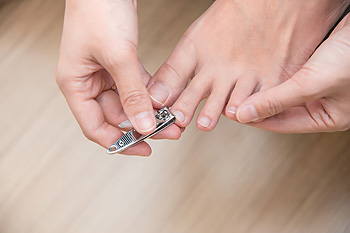
 Doctors that are referred to as podiatrists provide treatment for many foot conditions. These include ingrown toenails, foot and ankle injuries, and neuromas. The education podiatrists go through consists of medical school training, followed by obtaining a doctorate degree in podiatry. Many podiatrists choose to perform surgery that helps to correct bunions, hammertoe, and Achilles tendon injuries. Additionally, they are able to diagnose foot conditions which may improve from wearing custom made orthotics. These may be helpful in improving abnormal walking patterns, and patients who are afflicted with plantar fasciitis may find relief. If you would like to pursue a career in this field of medicine, please consult with a podiatrist who can answer any questions you may have.
Doctors that are referred to as podiatrists provide treatment for many foot conditions. These include ingrown toenails, foot and ankle injuries, and neuromas. The education podiatrists go through consists of medical school training, followed by obtaining a doctorate degree in podiatry. Many podiatrists choose to perform surgery that helps to correct bunions, hammertoe, and Achilles tendon injuries. Additionally, they are able to diagnose foot conditions which may improve from wearing custom made orthotics. These may be helpful in improving abnormal walking patterns, and patients who are afflicted with plantar fasciitis may find relief. If you would like to pursue a career in this field of medicine, please consult with a podiatrist who can answer any questions you may have.
If you are dealing with pain in your feet and ankles, you may want to seek help from a podiatrist. Feel free to contact one of our podiatrists from Achilles Foot Clinic. Our doctors can provide the care you need to keep you pain-free and on your feet.
What Is a Podiatrist?
A podiatrist is a doctor of podiatric medicine who diagnoses and treats conditions of the foot, ankle, and related structures of the leg. Your podiatrist may specialize in a certain field such as sports medicine, wound care, pediatrics, and diabetic care. Podiatrists have the ability to become board certified through training, clinical experience, and then taking an exam.
What Do Podiatrists Do?
On a daily basis, a podiatrist may perform the following activities:
It is very important that you take care of your feet. It’s easy to take having healthy feet for granted, however foot problems tend to be among the most common health conditions. Podiatrists can help diagnose and treat a variety of feet related conditions, so it is crucial that you visit one if you need assistance.
If you have any questions, please feel free to contact one our office, located in the South of Calgary, Alberta. We offer the newest diagnostic and treatment technologies for all your foot care needs.
The treatment and recovery for a broken ankle depends on the doctor’s specific diagnosis. For a stable ankle break, you may need to use crutches in order to keep weight off of the injury. You also may need to wear a boot or a cast. An unstable break, on the other hand, will typically require surgery. Both those with stable and unstable ankle breaks usually need to attend physical therapy. The recovery varies on the injury and the surgery. The time to return to low-impact athletic activity can span from three to four months for a stable ankle break, and nine months to one year for unstable ankle breaks. Be sure to consult with a podiatrist on the particular details of your ankle injury.
Broken ankles need immediate treatment. If you are seeking treatment, contact one of our podiatrists from Achilles Foot Clinic. Our doctors can provide the care you need to keep you pain-free and on your feet.
Broken Ankles
A broken ankle is experienced when a person fractures their tibia or fibula in the lower leg and ankle area. Both of these bones are attached at the bottom of the leg and combine to form what we know to be our ankle.
When a physician is referring to a break of the ankle, he or she is usually referring to a break in the area where the tibia and fibula are joined to create our ankle joint. Ankles are more prone to fractures because the ankle is an area that suffers a lot of pressure and stress. There are some obvious signs when a person experiences a fractured ankle, and the following symptoms may be present.
Symptoms of a Fractured Ankle
If you suspect an ankle fracture, it is recommended to seek treatment as soon as possible. The sooner you have your podiatrist diagnose the fracture, the quicker you’ll be on the way towards recovery.
If you have any questions, please feel free to contact one our office, located in the South of Calgary, Alberta. We offer the newest diagnostic and treatment technologies for all your foot care needs.
 Research has indicated 1 billion people in the world are obese.This may play a significant role in causing uncomfortable foot conditions.This is a result of the added weight the feet must endure while completing daily activities. Obese patients may find difficulty in finding shoes that fit correctly, and this leads to foot pain. Additionally, performing regular exercise is helpful in losing extra weight. People who are overweight will find it beneficial to start an exercise routine slowly, and gradually increase the frequency. Walking is considered to be an excellent form of exercise, in addition to cycling, swimming, or weight lifting. If you would like more information about how obesity affects the feet, please consult a podiatrist who can provide you with the proper information.
Research has indicated 1 billion people in the world are obese.This may play a significant role in causing uncomfortable foot conditions.This is a result of the added weight the feet must endure while completing daily activities. Obese patients may find difficulty in finding shoes that fit correctly, and this leads to foot pain. Additionally, performing regular exercise is helpful in losing extra weight. People who are overweight will find it beneficial to start an exercise routine slowly, and gradually increase the frequency. Walking is considered to be an excellent form of exercise, in addition to cycling, swimming, or weight lifting. If you would like more information about how obesity affects the feet, please consult a podiatrist who can provide you with the proper information.
Obesity has become very problematic at this point in time and can have extremely negative effects on the feet. If you’re an obese individual and are concerned about your feet, contact one of our podiatrists from Achilles Foot Clinic. Our doctors can provide the care you need to keep you pain-free and on your feet.
Obesity and Your Feet
Since your feet are what support your entire weight when standing, any additional weight can result in pain and swelling. Being overweight is one of the main contributors to foot complications.
Problems & Complications
Extra Weight – Even putting on just a few extra pounds could create serious complications for your feet. As your weight increases, your balance and body will shift, creating new stresses on your feet. This uneven weight distribution can cause pain, even while doing the simplest tasks, such as walking.
Diabetes – People who are overweight are at serious risk of developing type-2 diabetes, which has a drastic impact on the health of your feet. As you get older, your diabetes might worsen, which could lead to loss of feeling in your feet, sores, and bruises. You could also become more prone to various infections.
Plantar fasciitis – Pressure and stress that is placed on muscles, joints, and tendons can trigger plantar fasciitis, which is an inflammation of tissue that forms along the bottom of the foot.
If you have any questions, please feel free to contact one our office, located in the South of Calgary, Alberta. We offer the newest diagnostic and treatment technologies for all your foot care needs.
 When the feet feel good, the overall health of the body is positively affected. There are several methods that can be implemented for daily foot care. These include using warm water to wash your feet every day, applying a good moisturizer, and carefully trimming the toenails. Research has indicated feet are larger in the afternoon, and it is beneficial to purchase shoes in the middle of the day to ensure a maximum level of comfort. If you use community pools, showers or locker rooms, it is advised to wear appropriate shoes, which can help prevent foot conditions such as athlete's foot or toenail fungus. If you would like additional information about proper foot care, please consult with a podiatrist who can answer any questions you have.
When the feet feel good, the overall health of the body is positively affected. There are several methods that can be implemented for daily foot care. These include using warm water to wash your feet every day, applying a good moisturizer, and carefully trimming the toenails. Research has indicated feet are larger in the afternoon, and it is beneficial to purchase shoes in the middle of the day to ensure a maximum level of comfort. If you use community pools, showers or locker rooms, it is advised to wear appropriate shoes, which can help prevent foot conditions such as athlete's foot or toenail fungus. If you would like additional information about proper foot care, please consult with a podiatrist who can answer any questions you have.
Everyday foot care is very important to prevent infection and other foot ailments. If you need your feet checked, contact one of our podiatrists from Achilles Foot Clinic. Our doctors can provide the care you need to keep you pain-free and on your feet.
Everyday Foot Care
Often, people take care of their bodies, face and hair more so than they do for their feet. But the feet are a very important aspect of our bodies, and one that we should pay more attention to. Without our feet, we would not be able to perform most daily tasks.
It is best to check your feet regularly to make sure there are no new bruises or cuts that you may not have noticed before. For dry feet, moisturizer can easily be a remedy and can be applied as often as necessary to the affected areas. Wearing shoes that fit well can also help you maintain good foot health, as well as making it easier to walk and do daily activities without the stress or pain of ill-fitting shoes, high heels, or even flip flops. Wearing clean socks with closed shoes is important to ensure that sweat and bacteria do not accumulate within the shoe. Clean socks help to prevent Athlete’s foot, fungi problems, bad odors, and can absorb sweat.
If you have any questions, please feel free to contact one our office, located in the South of Calgary, Alberta. We offer the newest diagnostic and treatment technologies for all your foot care needs.